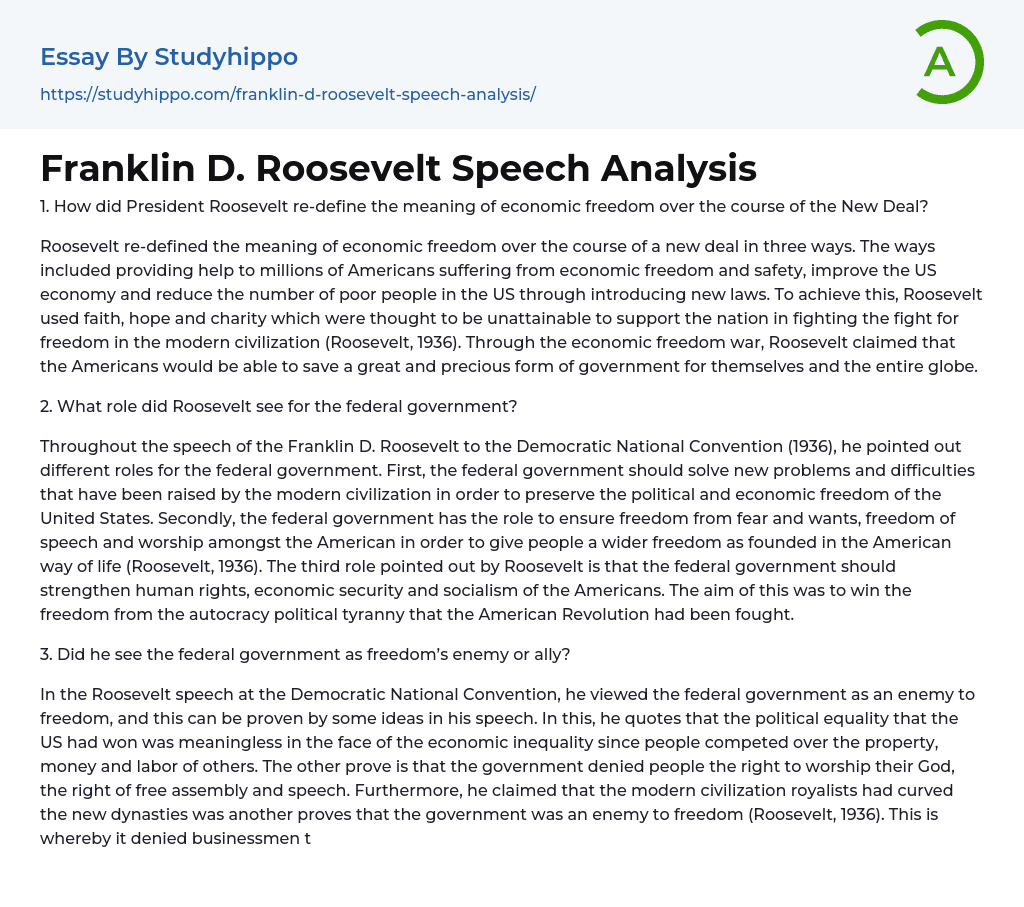1. How did President Roosevelt re-define the meaning of economic freedom over the course of the New Deal?
Roosevelt re-defined the meaning of economic freedom over the course of a new deal in three ways. The ways included providing help to millions of Americans suffering from economic freedom and safety, improve the US economy and reduce the number of poor people in the US through introducing new laws. To achieve this, Roosevelt used faith, hope and charity which were thought to be unattainable to support the nation in fighting the fight for freedom in the modern civilization (Roosevelt, 1936). Through the economic freedom war, Roosevelt claimed that the Americans would be able to save a great and precious form of government for themselves and the entire globe.
2. What role did Roosevelt see for the federal government?
Throughout the speec
...h of the Franklin D. Roosevelt to the Democratic National Convention (1936), he pointed out different roles for the federal government. First, the federal government should solve new problems and difficulties that have been raised by the modern civilization in order to preserve the political and economic freedom of the United States. Secondly, the federal government has the role to ensure freedom from fear and wants, freedom of speech and worship amongst the American in order to give people a wider freedom as founded in the American way of life (Roosevelt, 1936). The third role pointed out by Roosevelt is that the federal government should strengthen human rights, economic security and socialism of the Americans. The aim of this was to win the freedom from the autocracy political tyranny that the American Revolution had been fought.
3. Did he se
the federal government as freedom’s enemy or ally?
In the Roosevelt speech at the Democratic National Convention, he viewed the federal government as an enemy to freedom, and this can be proven by some ideas in his speech. In this, he quotes that the political equality that the US had won was meaningless in the face of the economic inequality since people competed over the property, money and labor of others. The other prove is that the government denied people the right to worship their God, the right of free assembly and speech. Furthermore, he claimed that the modern civilization royalists had curved the new dynasties was another proves that the government was an enemy to freedom (Roosevelt, 1936). This is whereby it denied businessmen the ability to use American system of initiative and profit.
4. Did Roosevelt see economic security as a political condition of personal freedom?
It is true that Roosevelt viewed the economic security as a political condition of personal freedom. This is whereby he emphasized on freedom security that was not only based on physical security from attacks of aggressors but also for the economic security. Furthermore, he added that a true individual freedom cannot exist in a state if there is the absence of economic security and independence. In this, he had viewed that necessitous men are not free men since they are hungry and jobless. Also, the idea of Roosevelt that a nation cannot be content if a third or one tenth of the citizens is ill-fed, ill-clothed and insecure showed that economic security is part of an individual personal freedom (Roosevelt, 1936). Furthermore, he adds that people liberty and freedom requires
an opportunity to make a living which is based on economic security.
Reference
Roosevelt, F. D. (1936). Speech before the 1936 Democratic National Convention. Philadelphia, Pennsylvania, June, 27.
- Abraham Lincoln essays
- Andrew Jackson essays
- Barack Obama essays
- Bill Clinton essays
- Donald Trump essays
- Franklin D. Roosevelt essays
- George W. Bush essays
- George Washington essays
- James Madison essays
- John F. Kennedy essays
- Lyndon B. Johnson essays
- Richard Nixon essays
- Theodore Roosevelt essays
- Thomas Jefferson essays
- Vice President essays
- Free Speech essays
- Freedom Of Speech essays
- Gettysburg Address essays
- Informative Speech essays
- Persuasive Speech essays
- Public Speaking essays




